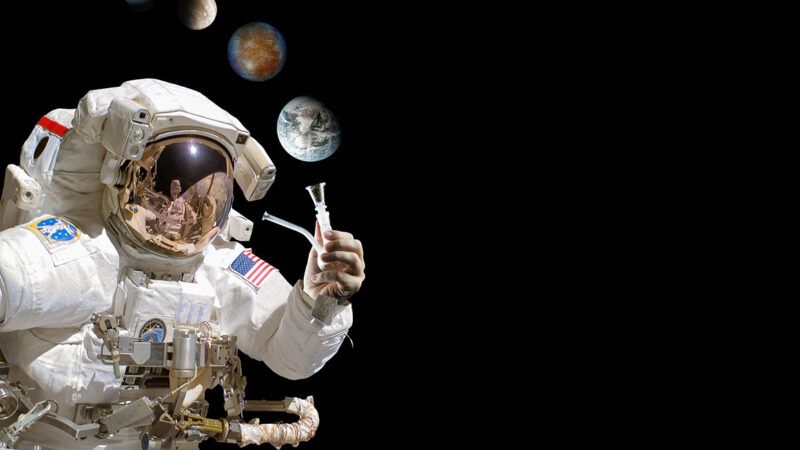How To Use Drugs in Space
It's best to avoid sparking up a doobie on a spaceship, but there are other ways to consume substances in the cosmos.

After SpaceX founder Elon Musk smoked a blunt on Joe Rogan's podcast in 2018, astrophysicist Neil deGrasse Tyson was happy to cut him some slack. "Let the man get high if he wants to get high," Tyson told TMZ. "He's the best thing we've had since Thomas Edison."
But when Tyson was asked "what it would be like smoking weed in space," he struck a note of caution. "The problem is, in space now, many things will kill you," he said. "So if you do anything to alter your understanding of what is reality, that's not in the interest of your health. If you want to get high in space, lock yourself in your cabin and don't come out, because you could break stuff inadvertently."
If you want to get high in space, there are some other issues to consider.
Reporting on Tyson's comments, Live Science suggested that sparking up a doobie would pose a serious hazard "in the oxygen-rich environment of a space station," especially since fire burns and spreads unpredictably in zero gravity. A 2020 article in Fire Technology noted that "the fire risk in a spacecraft is more challenging than most terrestrial locations due to inevitable use of polymers and potential ignition sources in cramped quarters, limited resources for fire response, and limited evacuation strategy."
Partly for those reasons, smoking is prohibited on the International Space Station, and it was not allowed on the Apollo moon missions either. So if you want to get high in space, modes of administration that do not involve combustion—swallowing, vaping, snorting, etc.—seem preferable.
Space travel also may require a dose adjustment. Although there is not much research on the subject, a 2017 review in the European Journal of Pharmaceutical Sciences noted that "spaceflight alters human physiology" in ways that "may change the pharmacokinetics and/or pharmacodynamics of medications used by astronauts."
It is prudent to be aware of which drug laws notionally apply beyond Earth's atmosphere. Under the 1967 Outer Space Treaty, according to a 2019 essay by Danielle Ireland-Piper, an expert on international law at the Australian National University, "a spacefaring criminal would generally be subject to the law of the country of which they are a citizen, or the country aboard whose registered spacecraft the crime was committed, because the treaty grants that country authority 'over any personnel thereof.'" But Ireland-Piper adds that "the term 'personnel' is not defined, and this raises questions as to what the case might be for private citizens" such as "an Australian space tourist flying aboard a US-registered spacecraft."
A Canadian citizen on a Canadian spacecraft presumably would not be breaking any laws if he packed marijuana edibles, which are legal in Canada. But a U.S. citizen on a U.S. spacecraft would be violating federal law if he did the same thing, even if he bought those goodies from a state-licensed store and boarded in a jurisdiction where marijuana possession was locally legal.
Bringing your own drugs is not the only option. Apollo astronauts, for example, had access to the stimulant dextroamphetamine (Dexedrine), the opioid analgesic meperidine (Demerol), and scopolamine, which in low doses can be used to treat motion sickness. At higher doses, scopolamine, a.k.a. Devil's Breath, can "induce delirium-like hallucinations, hyperactivity, altered affective states and amnesia," as a 2019 article in Behavioural Brain Research put it. The effects are often unpleasant, which helps explain why the drug has never been very popular as a recreational intoxicant. The space station has supplies of hydrocodone (Vicodin) instead of meperidine; lorazepam (Ativan), a benzodiazepine used to relieve anxiety and insomnia; and modafinil (Provigil), a stimulant used to treat "excessive sleepiness" and "shift work sleep disorder."
All of those psychoactive substances are intended for medical use only, of course. But the question of how to maintain pharmaceutical supplies on long-term space missions has raised some possibilities that may interest recreational users.
Karen McDonald, a professor of chemical engineering at the University of California, Davis, is conducting research aimed at genetically modifying lettuce to produce medicines that would be useful to space travelers. So far she has focused on compounds like parathyroid hormone, which could help astronauts counteract the impact of zero gravity on bone density. But if it turns out that genetically modified plants can be used to produce drugs in space, psychonauts may come up with other applications.


Show Comments (15)